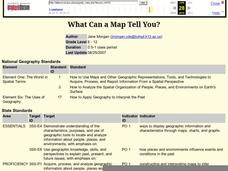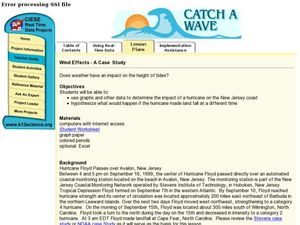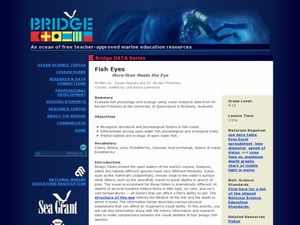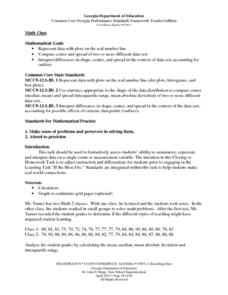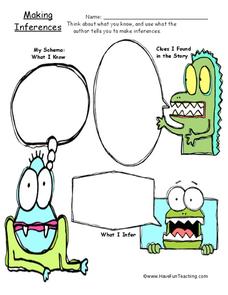Discovery Education
Motion in the Ocean
How do temperature changes affect ocean currents? Scholars explore convection currents by demonstrating the flow of water in a baking dish. They use ice, heat, and food coloring to see currents. Then, they draw conclusions about their...
American Museum of Natural History
Theodore Roosevelt's Outdoor Adventures
Time for a virtual sightseeing trip. Pupils explore the Grand Canyon, Devil's Tower, and Yosemite Valley in an interactive online experience. They answer questions about the organisms in each location and draw conclusions based on their...
Curated OER
What Can a Map Tell You?
Students investigate how maps can provide useful information about health issues. They study a map to draw conclusions about cholera death in London.
Teach Engineering
Are We Alone?
Find an answer to the age-old debate of whether life exists on Mars. Groups determine criteria to help look for signs of life on Mars. The activity has the class simulate testing Martian soil samples for signs of life before drawing...
Curated OER
Probability for the Novice
The comprehensive, overall purpose in teaching probability is to help learners draw conclusions about the characteristics of a large group given a small sample taken from the group. Probability is related to predicting the chance of a...
Curated OER
How Credit Card Interest Works
Students experiment with an Excel spreadsheet model that demonstrates the effects of interest on payments. They calculate actual costs, interest paid, and time necessary to pay off credit purchases and draw conclusions about the...
Curated OER
Wind Effects- A Case Study
Students explore hurricanes. In this weather data interpretation lesson, students draw conclusions about the impact of Hurricane Floyd as it related to weather conditions. Students read and interpret a tide data table, a barometric...
Curated OER
Exploring Contrasts in "The Lanyard" by Billy Collins
Middle schoolers analyze the speaker's ideas and tone in the Billy Collins poem "The Lanyard." After identifying how each of the five senses is addressed in the poem, they compare images to draw conclusions about the speaker and his...
Curated OER
The Sinking of the Titanic
Investigate the sinking of the Titanic with young scholars. They will read actual documentation from the Titanic and answer questions. They will then draw conclusions from the pictures they see and information they read.
Curated OER
Gathering Statistics for Research
Students gather statistics to include in their research. In this statistics lesson, students investigate how to incorporate statistics into research and other readings besides math. They collect data based on other topics, analyze the...
Curated OER
Two Settings
Learners respond to the text Riding Freedom. They will compare and contrast two settings by filling in a graphic organizer. They explore different settings, discuss the reasons why settings change, and draw conclusions using descriptive...
Curated OER
Feeling the Heat
Pupils record temperatures at different locations around campus. They examine the results and draw conclusions about how materials and colors affect the amount of heat produced. They also analyze Los Angeles' temperature records over a...
Curated OER
Fish Eyes - More than Meets the Eye
Inform your class about the adaptations in fish eyes: cones, lens size, endothermy, and speed of vision. The adaptations are related to diving behavior. Junior marine scientists compare the adaptations of four different fish species to...
Curated OER
Poetry Comprehension: Alfred Noyes' "The Highwayman"
Eight questions regarding Alfred Noyes' poem "The Highwayman" assess comprehension; readers infer, recall details, summarize, draw conclusions, compare and contrast, and respond to literature. A clean, useful resource if this poem is on...
Teach Engineering
Insulation Materials Investigation
Don't melt away! Pairs investigate different insulation materials to determine which one is better than the others. Using a low-temp heat plate, the teams insulate an ice cube from the heat source with a variety of substances. They...
Teach Engineering
Hydrogen-Oxygen Reaction Lab
High schoolers conduct an experiment using the reaction of hydrogen and oxygen. After pairs balance the chemical equation for making water, they mix different ratios of hydrogen and oxygen in a chemical reaction. Classmates...
Curated OER
Hazards of Defrosted Food
Peas spoilage hot, peas spoilage cold: examine the bacterial growth on newly defrosted peas versus peas that have been defrosted for 24 hours. Using the session one questions in the "Microbes and Food Spoilage" PDF, learners will make...
Illustrative Mathematics
Equivalent fractions approach to non-repeating decimals
Trying to get your class to think of decimals as fractions and vice versa can lead to interesting discussions. After all, we can usually understand quickly that 1/4 is .25 but why is 1/7 not so easy to convert? This activity looks...
Yummy Math
Steep Hikes
Grab your hiking gear and get ready for a math adventure! Learners explore the meaning of percent grade change, as compared to the slope in an excellent worksheet activity about hiking trails in the mountains of New Hampshire. They...
California Academy of Science
Discovering Rainforest Locations
How many rainforests are there, where are they, and do global factors effect their locations? These are great questions that have great answers. Children in grades four through eight use several different maps to determine why...
Outside Education
Plant a Plant in Anything!
Primary graders repurpose items brought from home to create containers for plants. After poking holes in their containers, kids add soil and plant seeds or transplant an item, and then observe and draw conclusions about which items...
Georgia Department of Education
Math Class
Young analysts use real (provided) data from a class's test scores to practice using statistical tools. Not only do learners calculate measures of center and spread (including mean, median, deviation, and IQ range), but...
Have Fun Teaching
Making Inferences (21)
Monstrous! But do not be afraid! These weird-looking creatures won't scare readers away from making inferences about what authors are trying to show, rather than tell their readers. Instead the toothy, bug-eyed aliens model the...
Curated OER
Earthquakes: Sixth Grade Lesson Plans and Activities
Young seismologists learn more about plate tectonics with a set of pre-lab, lab, and post-lab lessons plans on earthquakes. After exploring how waves travel through various materials, sixth graders record their observations and...
Other popular searches
- Drawing Conclusions Reading
- Data. Drawing Conclusions
- Drawing Conclusions Lessons
- Drawing Conclusions in Reading
- Data Drawing Conclusions
- Reading "Drawing Conclusions
- Drawing Conclusions Worksheets
- Drawing Conclusions Science
- Drawing Conclusions From Text
- Drawing Conclusions Activities
- Drawing Conclusions From Data




